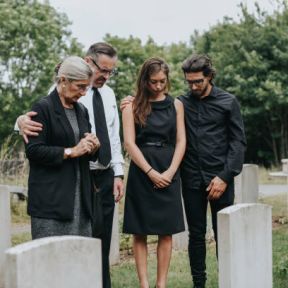Surviving a Suicide Attempt
Suicide attempts are significantly more common than completed suicides. In 2019, for example, the CDC reported that in the U.S., there were 47,500 completed suicides compared to 1.4 million attempts—and while both of these numbers are likely underreported, they suggest that less than 5 percent of suicide attempts are fatal.
Those who attempt suicide and survive often require significant support afterward, and should seek mental healthcare if they are able. But the good news is that while some who have attempted suicide continue to struggle with suicidal thoughts, the majority of those who attempt suicide will not attempt suicide again; overall, the CDC reports that more than 90 percent of those who survive a suicide attempt will not go on to die by suicide.
For immediate help in the U.S., 24/7: Call 988 or go to 988lifeline.org. Outside of the U.S., visit the International Resources page for suicide hotlines in your country. To find a therapist near you, see the Psychology Today Therapy Directory.
On This Page
Most suicide attempts are non-fatal, and most people who attempt suicide do not go on to attempt again. But that doesn't mean that surviving a suicide attempt will immediately solve the issues that first drove the person to make an attempt on their own life. Understanding the potential emotional aftermath of an attempt—and being aware that anyone who attempted suicide once may still be at risk—is necessary for helping survivors get mentally well and protecting them from future harm.
The emotions that follow a suicide attempt can vary widely—from relief and hopefulness to sadness, anger, or regret. Some suicide survivors report feeling immediate second thoughts after the attempt, followed by an intense feeling of relief when they realized they’d survived. Some feel as if they’ve been given a new lease on life, and are able to return to their lives with a greater sense of purpose and gratitude; others report feeling as if a burden has been lifted—especially if they had been keeping their mental health challenges or suicidal thoughts secret from their loved ones—or as if they've been “snapped out” of their despair.
But sadly, such feelings aren’t universal. Some who survive a suicide attempt report feeling disappointed, ashamed, empty, or even more depressed than they were before. Although some evidence suggests that such negative feelings will dissipate for the majority of suicide attempt survivors, they should be heeded if present, as they may indicate that the individual is still at risk of suicidal thoughts or future suicidal behaviors. While anyone who has attempted suicide should seek mental healthcare in the immediate aftermath, it is especially imperative for those who continue to feel predominantly negative or who are having thoughts of a future attempt.
For more on finding help in a crisis, see Seeking Help for Suicidal Thoughts.
They can be. While many people who attempted suicide go on to live happy, fulfilling lives, previous suicide attempts are known risk factors for future attempts. Thus, it’s important for anyone who has attempted suicide in the past, and their loved ones, to pay attention to their mental well-being and seek immediate help when thoughts of suicide resurface.
Most people who attempt suicide—approximately 70 percent, according to some studies—will never attempt suicide again. Of those who do attempt suicide again, most will survive. Studies have estimated that anywhere from 5 to 13 percent of those who attempt suicide will later go on to die by it.
Despite the relative prevalence of non-fatal suicide attempts, survivors are often left out of conversations around suicide, and their well-being post-attempt has not been the subject of a significant amount of research. In order to improve the lives of suicide attempt survivors and to reduce their risk of later death by suicide, researchers suggest an increased focus on their mental state after an attempt—with a particular focus on identifying the factors that promote well-being and resilience.
Important, too, is a better understanding of what differentiates those who go on to attempt again and those who don’t, along with the emotional and social strategies that can best help individuals cope. Psychological flexibility, for example, is theorized to help survivors move forward after the attempt, rather than ruminating on it. If such theories are held up in research, treatment approaches that foster psychological flexibility—both before and after an attempt—may be valuable to explore.
There is no shame in having attempted suicide, and most survivors go on to lead full, fulfilling lives. But after a non-fatal suicide attempt, it's normal—indeed, expected—to feel many conflicting emotions, and survivors may continue to struggle with the mental health or social challenges that drove them to suicidal thoughts in the first place. For this reason, most experts agree that mental healthcare should be a priority for anyone who survived a suicide attempt, even if they're feeling OK in the immediate aftermath. Beyond that, seeking support from friends and family and identifying meaning and purpose in life are critical for recovery—as is reminding oneself that recovery is indeed possible.
In the immediate aftermath of a non-fatal suicide attempt, it’s critical to seek medical and psychological care—either by calling a local emergency number or going to the nearest hospital. Once stability has been achieved, taking steps to bolster your mental health is imperative—if you are able, you should seek the help of a therapist as soon as possible to help navigate your mental state and learn coping skills to help you guard against future attempts. (To find a professional near you, visit the Psychology Today Therapy Directory.)
It’s normal to experience feelings of shame after an attempt, to deliberately isolate yourself, or to attempt to keep what happened a secret from others. But social connection is especially important in the wake of a suicide attempt, and can be powerfully healing. It’s very likely that your loved ones are deeply worried about you and want to help, even if they’re not quite sure what to do or say. Experts recommend reaching out to others as much as you’re able, and letting them know that you are hurting and need their help. Joining a support group can be useful toward this end; connecting with other attempt survivors can both provide social contact and can help you identify new coping skills that you can make use of if feelings of sadness or instability start to return.
In the long-term, finding a sense of purpose has been shown to help suicide attempt survivors recover from despair and once again feel there is meaning in life. What that purpose looks like will be different for everyone—some survivors, for example, choose to share their story with others, to educate them about suicide and emphasize that recovery is possible. But research consistently suggests that suicidal individuals who do not go on to die by suicide cite their desire to contribute to society and help others as an important reason to keep living; identifying what that might mean for you, and pursuing it, can be an important step in the road to recovery.
Continuing thoughts of suicide are, unfortunately, a reality for some who survive a suicide attempt; the thoughts may be continuous, or they may fade temporarily but return after a brief respite. Regardless of when they arise, however, it’s imperative to seek help for suicidal thoughts as soon as possible—either by calling a local emergency number or a suicide hotline in your country (those in the U.S. should call the National Suicide Prevention Lifeline at 1-800-273-TALK; those located elsewhere can search for local resources on the Suicide Hotlines and Prevention Resources page).
Many people who survive a suicide attempt are struck by the sudden realization that, despite the prior allure of their suicidal thoughts, they actually don’t want to die. While this is undoubtedly a positive epiphany, it doesn’t mean that their mental health concerns or life stressors will immediately disappear. It does, however, lay the groundwork for them to take charge of their mental health and start to identify what they need in order to move toward recovery.
The first step, of course, is seeking mental healthcare. Depression, bipolar disorder, and many other mental health conditions that can lead to thoughts of suicide are highly treatable, and treatment greatly reduces the risk of further suicide attempts. It’s important, too, to make a concrete safety plan (see below) to help you ward off future suicidal thoughts, should they arise.
Many experts and attempt survivors also recommend prioritizing self-care and taking care of your physical health as much as possible. Eating healthy food, exercising regularly, and getting enough sleep can have a powerful effect on mood and mental well-being. Self-care isn’t a cure-all, but in the wake of a suicide attempt, it can foster self-efficacy and ensure you have the energy and stamina to face mental health challenges as they arise.
Many who survive suicide attempts report that their brush with death made them cognizant of all they have to live for, and how much they do in fact want to be alive. Some even report feeling hopeful for the first time in years. While this sudden reversal of emotions can be uplifting, it can also be confusing in some ways; someone may question the validity of these emotions or may harbor fears that they are only temporary. Even someone who is feeling hopeful after an attempt can benefit immensely from seeking help from a trained mental health professional—both to preserve and make sense of their newfound positivity and to help strengthen coping skills that will protect them from future periods of low mood.
Developing a personalized “safety plan” is an evidence-supported strategy for keeping yourself safe from a future suicide attempt; in one study, for example, ER patients who made safety plans after being hospitalized for a suicide attempt were 45 percent less likely to demonstrate further suicidal behavior than those who did not. Safety plans are theorized to foster self-efficacy—or the belief that one has the necessary skills to confront life's challenges—as well as make coping skills easier to call to mind in a crisis.
A suicide safety plan may or may not be a written document. Regardless of whether it's formally written out, it typically includes most or all of the following elements:
• Identify the warning signs of a suicidal crisis (i.e. low mood, persistent thoughts of death, reckless behaviors, etc) to recognize when the individual may be at heightened risk
• Brainstorm distracting activities to engage in when suicidal thoughts arise (watching comforting TV, engaging in a hobby, meeting up with a friend, doing a relaxation exercise, etc.)
• Name people who can be called on for help if suicidal thoughts or behaviors start to escalate (friends, family, etc.)
• Identify professionals, agencies, suicide hotlines, or other emergency services that can be accessed in a crisis
It’s also important to limit access to lethal means as much as possible. This may mean locking up guns, making sure dangerous medications are not easily accessible, or taking other steps to make the immediate environment as safe as possible.
Whether to disclose your suicide attempt to trusted others is up to you. Many people find that being honest about their past struggles with suicidal thoughts and/or behavior can bring them closer to loved ones; what’s more, sharing your mental health history may allow your loved ones to better support you in the future and do their part to keep you safe. Many survivors also come to learn that sharing their story with others helps them process their own feelings about it and is an important step on their continued journey toward mental health. They may even find that their story reduces stigma in their community or offers valuable lessons that may stop others from considering suicide themselves.
There is, however, a significant amount of stigma lingering around the subject of suicide and suicide attempts—and unfortunately, some people will not respond empathetically when they learn that someone has attempted suicide in the past. Thus, it’s important to only disclose to individuals that you trust or to at least mentally prepare yourself for the possibility of backlash. One’s career can add an additional obstacle: individuals in some professions, like medicine or law enforcement, may worry about facing professional consequences if they disclose past suicide attempts or current mental health problems. While steps are currently being taken to decrease stigma and encourage anyone who needs mental health care to seek it—regardless of their profession—it may still be prudent to carefully weigh any decision to disclose a past suicide attempt in a professional setting.
When a loved one attempts suicide, it's normal to be confused, frightened, or angry. It's also normal to have questions: "Why did she do this?" "Could I have stopped him?" These questions, in many cases, have no easy answers. But one thing is clear: After an attempt, survivors need support, and having a loved one by their side is often a key part of their recovery. Along the way, it's important for their loved ones to take care of themselves and make sure they seek help if they need it.
It can be difficult to know what to say or do in the wake of a loved one’s suicide attempt—but unless you’re a trained mental health professional, what your loved one likely needs from you now is not for you to say the “right” thing. Instead, just be there for him, in whatever way(s) he is most comfortable with. Check in regularly, even if just to say “I’m thinking of you.” If he wants to talk about the suicide attempt, make an effort to listen empathetically and nonjudgmentally; ask open-ended questions and give him the space to sort through his difficult feelings in the wake of the crisis.
Don’t be afraid to ask directly if he’s still thinking of hurting himself. Whether or not he is still struggling with suicidal thoughts, he will likely appreciate your willingness to address the issue head-on. In the wake of a suicide attempt, it's common for people to dance around the subject or act as if it is somehow shameful, which can worsen survivors’ mental health in the long-run.
Many people find that they feel anger toward their loved one after an attempt; while these feelings are valid, expressing anger toward your loved one in the immediate aftermath of an attempt is likely to be counterproductive. Instead, try to find an outlet for your own feelings—whether a therapist, a support group, or a trusted loved one—to make sure you are able to navigate your complicated emotions and support your loved one through his.
Practical help, too, can be valuable to survivors in the aftermath of a suicide attempt. Survivors may wish to locate longer-term mental health care—and if they don’t, you should encourage them to—but may be unsure where to start; helping them find a therapist or support group in their area can reduce their cognitive load and allow them to focus their energy on healing and self-care. Encourage and support healthy habits like eating a nutritious diet, regular exercise, and getting plenty of sleep.
Helping your loved one set up a suicide safety plan (above) is a proactive way to make sure she has access to help and knows what coping skills she can call on in a crisis. While not foolproof, studies suggest that safety plans greatly reduce the risk of future suicidal behavior and promote self-efficacy among suicide attempt survivors. If possible, limit your loved one’s access to lethal means, especially if she brings up suicide again. Beyond that, simply being there for your loved one when she needs it can do wonders for her mental health and may reduce the risk of future suicidal behavior.
A loved one’s suicide attempt is deeply disorienting, and can trigger feelings of anger, despair, guilt, or loneliness; it’s common, too, for someone to feel that their loved one’s suicide attempt was their fault. But many who struggle in the wake of a loved one’s suicide hesitate to seek help—in some cases because they believe they should be grateful that their loved one survived and feel guilty for experiencing other darker emotions. They may also feel selfish for needing help, believing that their loved one’s mental health should be the only priority.
But there is no shame in seeking mental healthcare after a loved one’s suicide attempt; indeed, taking care of yourself is just as important as taking care of them. Asking your own friends and family for emotional and practical support can be valuable, as can reaching out to a therapist or other mental health provider. Sharing the full scope of your feelings about your loved one’s attempt with a trusted other can allow you to better cope with them, and will help you find the strength you need to support your loved one and help them get the care they need. To find help near you, visit the Psychology Today Therapy Directory.














